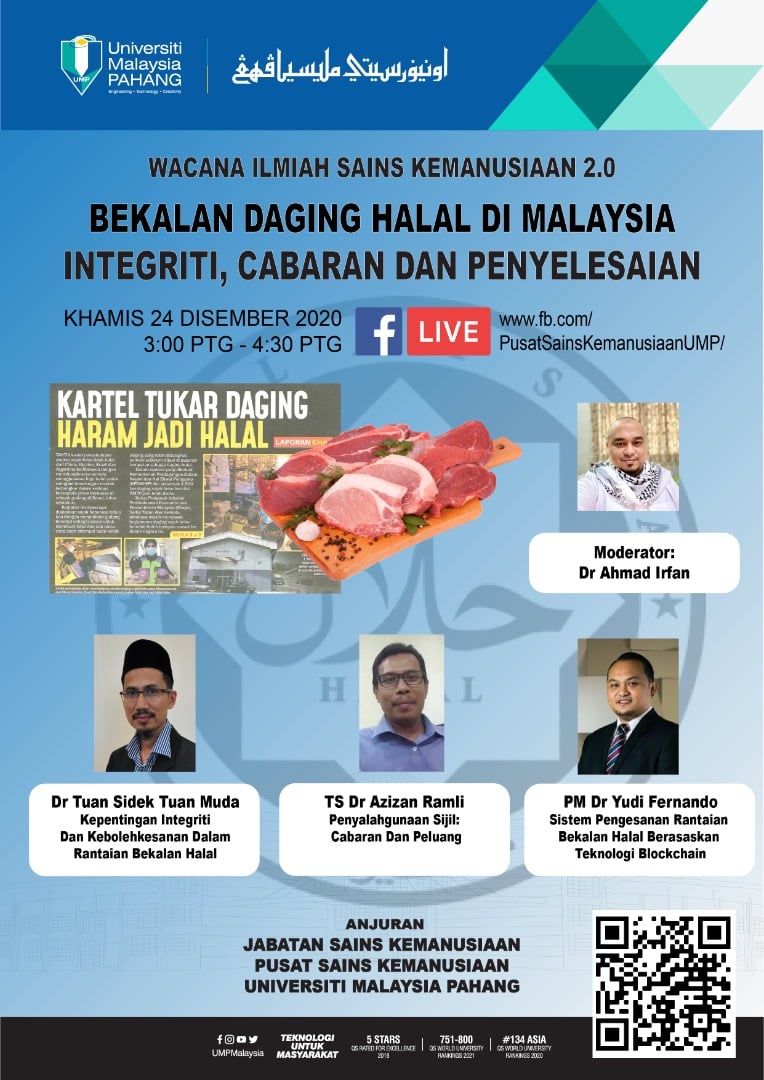Blockchain technology can improve food supply chain security
PEKAN, 24 December 2020 - Integrity and traceability systems in the food supply chain are very important in ensuring the safety of the food supply chain so that consumers get good and halal food products.
Along with the latest knowledge and technology developments in the Industrial Revolution (IR4.0), blockchain technology is seen to be able to strengthen the existing traceability system.
According to a lecturer from the Faculty of Industrial Management (FPI), Universiti Malaysia Pahang (UMP), Associate Professor Dr. Yudi Fernando, an expert in halal logistics and blockchain technology, many articles discuss this halal issue and the post-industrial revolution.
“To support this effort, the implementation of blockchain technology can increase the food supply chain security with the support of smart supply chain integration for production, transportation, storage and distribution.
“In the meantime, various related parties can review transactions, assess the business integrity and further facilitate monitoring by the authorities,” he said.
For a lecturer from the Centre for Human Sciences (PSK), Dr. Tuan Sidek Tuan Muda who is also a certified JAKIM Halal Instructor said, increasing the level of self-sufficiency and reducing the dependency on imported meat can reduce the issue of halal certificate fraud especially involving supplies from abroad because local supplies can be obtained more easily and meet the demand.
“Data found that the supply of imported meat is larger than local products, with an estimated 30 per cent of local meat supply compared to 70 per cent of imported meat supply.
“Data also show that in 2019, the self-sufficiency rate is around 25 per cent for meat while 11 per cent for goat,” he said, describing that the food chain from abroad is quite long compared to the local food chain which can offer a more secure halal control.
He said that the consumption of meat is quite critical as it is widely used in food and also for food ingredients.
“Meat is also easy to become non-halal and not tayyib due to unauthorised slaughtering method, hygiene management or unhealthy cattle, mixing during the storage or transportation processes that affect the halal status and prone to illegal meat cartel syndicate,” he said.
Meanwhile, a lecturer from the Faculty of Industrial Sciences and Technology (FSTI), Ts. Dr. Azizan Ramli, who is also a certified JAKIM Halal Instructor, said efforts to boost local meat consumption could address this issue.
“However, most consumers prefer imported meat because it is cheaper than local meat.
“Currently, Muslim consumers are becoming more aware of the use of the halal logo in food products but at the same time face challenges due to profiteering, logo and branding manipulation including the misuse of Malaysian Halal branding and transparency of industry and the authorities,” he said.
Three panellists involved in the Human Sciences Discourse (Wacana Ilmiah Sains Kemanusiaan) 2.0 programme organised by the Department of Humanities, PSK UMP, moderated by Dr. Ahmad Irfan Ikmal Hisham.
Among the issues discussed were the importance of integrity and traceability in the halal supply chain, the misuse of certificates and halal supply chain tracking system based on blockchain technology.
By: Mimi Rabita Abdul Wahit dan Siti Nurfarmy Ibrahim, Corporate Communications Unit, The Office of The Vice-Chancellor
Translation by: Dr. Rozaimi Abu Samah, Engineering College/Faculty of Chemical and Process Engineering Technology
- 162 views











